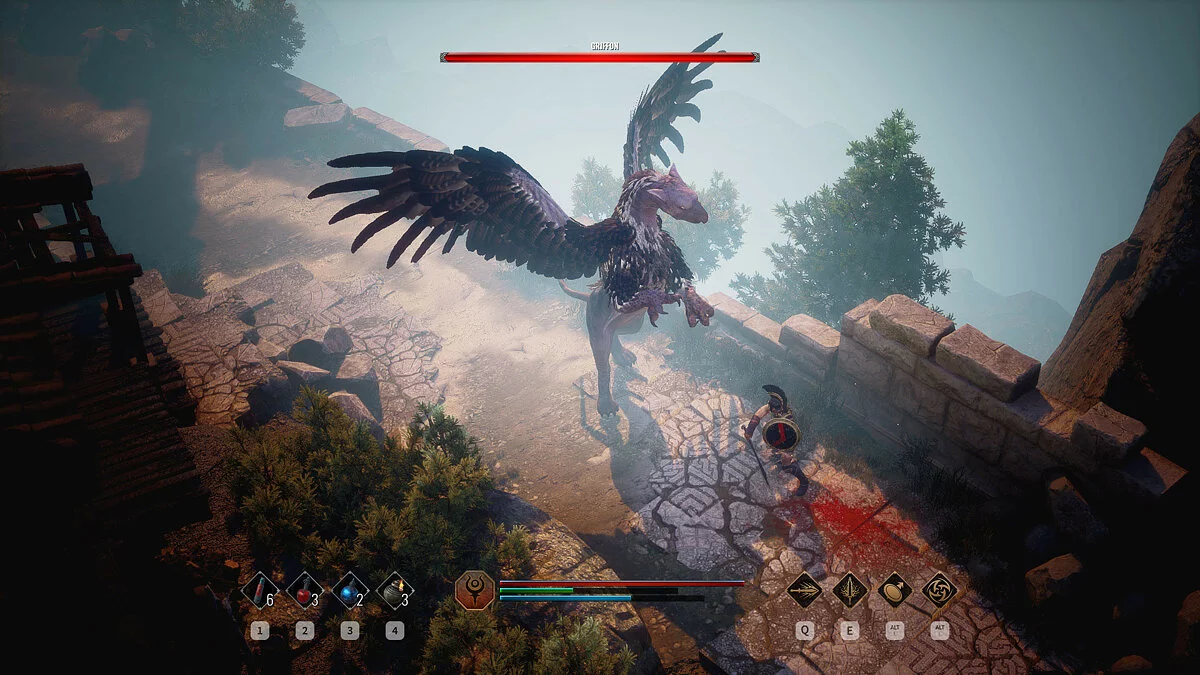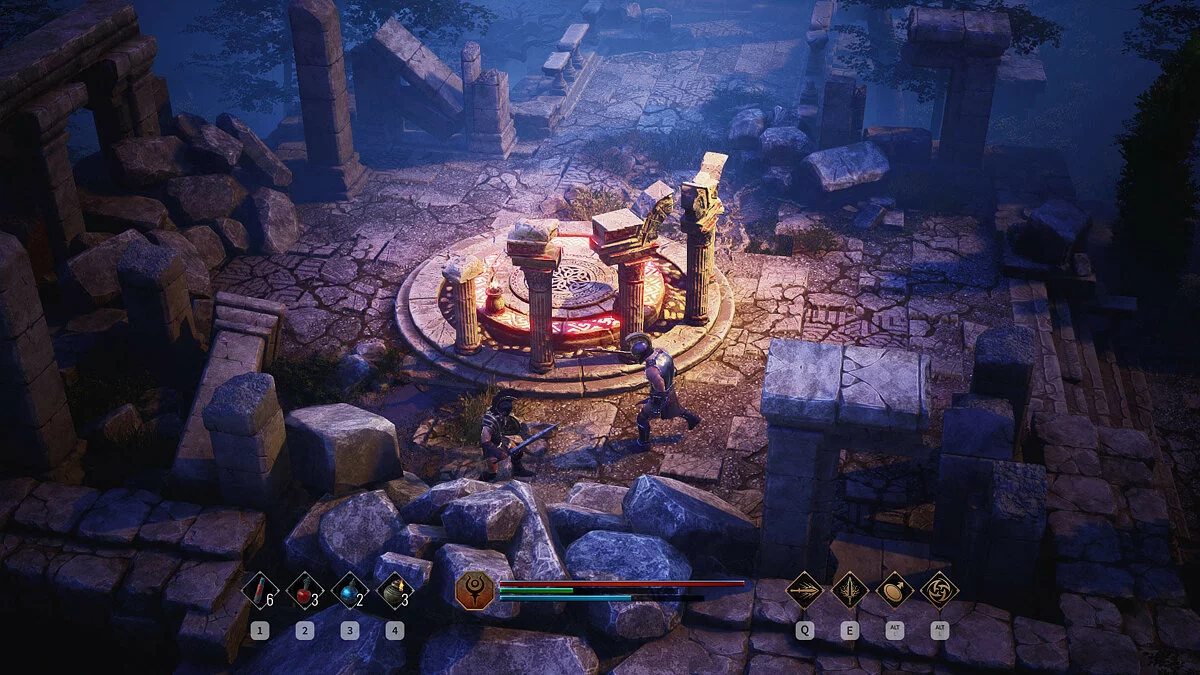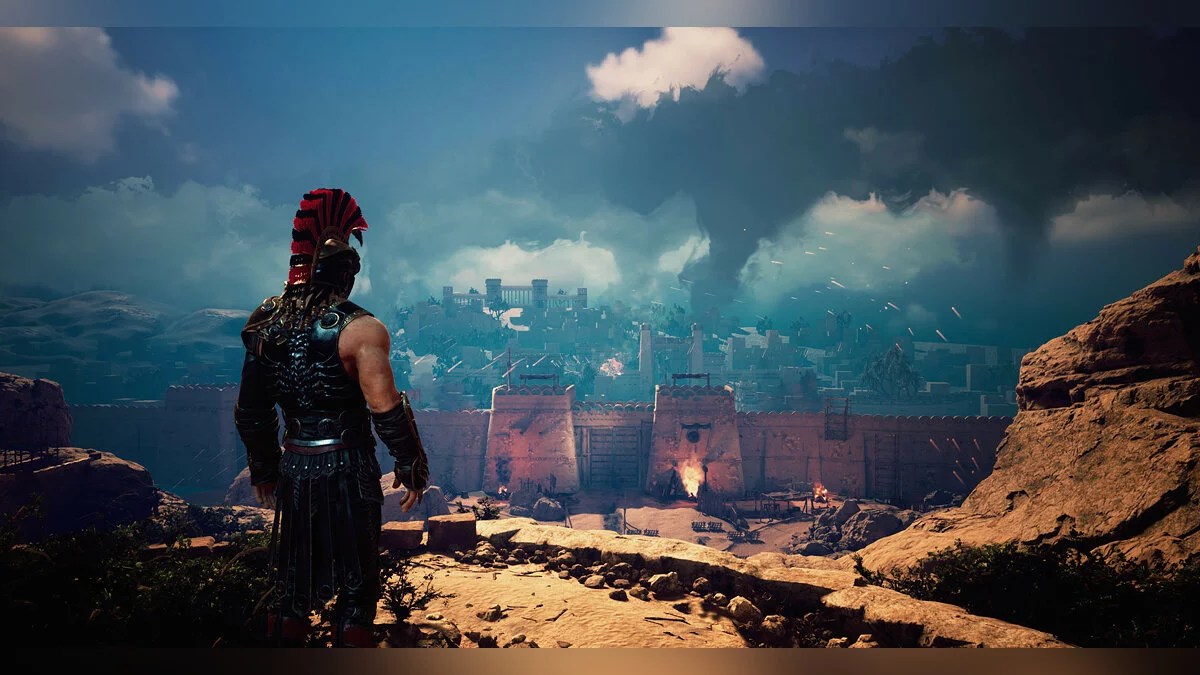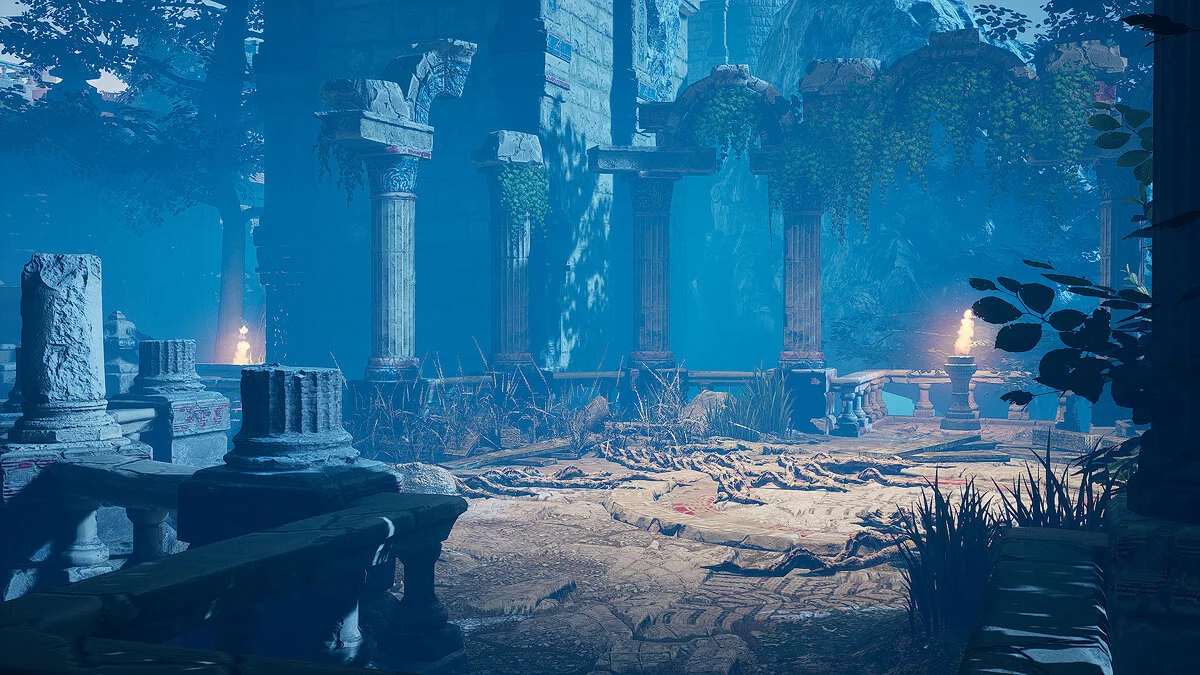VGTimes Interview with Achilles: Legends Untold Developers

In 2023, a lot of good and diverse games were released. This year will be especially memorable for fans of soulslikes, for whom the developers gave them a whole «pack» of hardcore projects that are not inferior in spirit and game design to Miyazaki's (Hidetaka Miyazaki) creations. In addition to the outright clones of Dark Souls, Sekiro and Bloodborne, an isometric interpretation of soulslike games, Achilles: Legends Untold, was released from early access. The project turned out to be quite unusual, and we could not pass by an interesting implementation of a genre popular among players.
Our editorial team talked to the lead developer of Achilles: Legends Untold and found out interesting details about working in the indie sphere, the difficulties of development, and prospects for young professionals.
Transferring Soulslike to isometric
The dizzying success of Dark Souls and similar games prompted many developers to create their own soulslike projects. Some studios tried to bring something new to the genre. For example, Remnant: From the Ashes added shooting and full-fledged co-op, and Wo Long: Fallen Dynasty «pulled» elements of Dynasty Warriors onto the soulslike mechanics.
There were also attempts to change the camera with perspective. This is how we got wonderful Soulslike 2D platformers that are not inferior to the 3D originals in quality and excitement. The most notable ones include Blasphemous 2, The Last Faith, Tails Of Iron, Grime and, with a stretch, Hollow Knight.
There were also attempts to transfer soulslike to isometric, but most projects are either still in development or abandoned due to the complexity of positioning and balancing. Russian developers have been making Spark in the Dark for several years now. The isometric clone of Dark Souls has an updated demo, but even the game designers themselves do not know when the game will be released. Another hyped project, Eitr, fell into production hell and will most likely never get out of it. And the developers of Chrono Sword disappeared completely after a successful crowdfunding campaign and have not posted any materials about the game for three years.
There are not many good examples of isometric Soulslikes. And of those that have been released, we can only note the short Morbid: The Seven Acolytes and Alaloth: Champions of The Four Kingdoms. The latter is more suited to ARPG than soulslike. However, last year, Achilles: Legends Untold appeared in early access, which managed to implement Dark Souls mechanics in isometric space. Of course, it wasn't without problems, but gamers helped the authors get rid of the shortcomings and polish the game.
VGTimes: Why did you choose an isometric camera for Achilles: Legends Untold? We are also interested to know how you came to this setting and character?
Dark Point Games Lead Developer Pawel Waszak: We wanted to make a soulslike game, but we didn't want to make it completely similar to FromSoftware projects with a third-person camera. We wanted to change something radically in the concept, so we used an isometric display of the gameplay. We made several prototypes and made sure that soulslike works great in a changed perspective.
The next step was choosing a setting. At that time, we had a small team, so we needed a more understandable universe for everyone, so that all employees could quickly get involved in the work. We chose the mythology of Ancient Greece, the team liked it, and this setting was rarely used in other game projects. Except maybe in Assassin's Creed Odyssey.
And of course, we needed a famous hero to play as. From the very beginning, we knew that we would base the game on a well-known character that players are familiar with. We had several options, but we settled on Achilles, as his story revolved around countless battles, and his unexpected resurrection after another death had a context formed by legends. In addition, this hero does not have a standalone game, unless you count projects dedicated exclusively to Troy.
In the end, we had to adapt the chosen setting to soulslike game design. We tried to combine these things for several months and came to the conclusion that we would leave the mythology of the Trojan War only for the prologue, and the rest of the game would be based on our own vision. That's why we used the Legends Untold tagline in the title. In addition, if we want to make another game with a famous mythological hero, we are free to come up with a unique story for him and include it in the Legends Untold series.
VGTimes: How hard is it to make soulslike games?
Pavel Vaszak: It's not as hard as it might seem at first glance. I've been working in the gaming industry for over 20 years, and when I'm shown boss fights in Lies of P or Elden Ring, I immediately understand how the systems in these games work. Understanding the fundamentals and technical aspects, these battles can be completed on the first try. After so many years in the industry, you look at these games from a different perspective. That's why it's hard for me to objectively assess the difficulty of developing soulslike games. For me personally, it's not that hard, while other developers might have problems with it.
It's important to keep in mind all the patterns, animation duration, attack speed, and gaps between hits. Players always try to speed up the animation, which leads to the death of their character. Developers have to compromise and make unnoticeable delays in playing the animation of opponents, otherwise the AI will always win — regardless of the experience of a particular player. In addition, we create specific conditions so that the user has a chance to win. For example, the player can always interrupt the animation, while the enemy cannot do this. There are a lot of nuances in polishing the balance, but if you know the rules of the genre, you can implement all your ideas without any problems.
VGTimes: Did you manage to implement all the mechanics within the chosen genre? Did all the original ideas make it to the release version?
Pavel Vaszak: We implemented almost everything regarding the mechanics. Of course, we couldn't make an attack from behind, since its implementation required too many animations. The game has a lot of weapons and various opponents, and each combination of these variables requires a unique animation. We had to abandon the instant kill from behind, but instead we added soul sucking a la Shang Tsung from Mortal Kombat, so that the player had an alternative way to quickly kill.
We didn't initially plan to create a very large game. It was a small project that unexpectedly doubled in size from the original idea. So we not only managed to implement all the planned mechanics, but also created a lot of new things that were not originally planned. We wanted to make one open world, but in the end there were two. We wanted to make several opponents, but in the end there were several times more of them.
VGTimes: How did players perceive the isometric camera in your game?
Pavel Vaszak: When we launched in early access, people did not immediately understand that Achilles was a soulslike game. Because of the isometric camera, the audience thought that they were in for a Hack&Slash like Titan Quest. This led to misunderstandings. We had to spend a lot of time explaining to players that this was a soulslike, not a Hack&Slash. As a result, we came to the conclusion that we needed to combine both genres so that players would not feel deceived. Throughout the early access, we adjusted the combat system in such a way that Hack&Slash fans received recognizable features of the genre, but at the same time, the corre-design remained on the side of soulslike games. In the end, we added difficulty levels to satisfy both sides of the players.
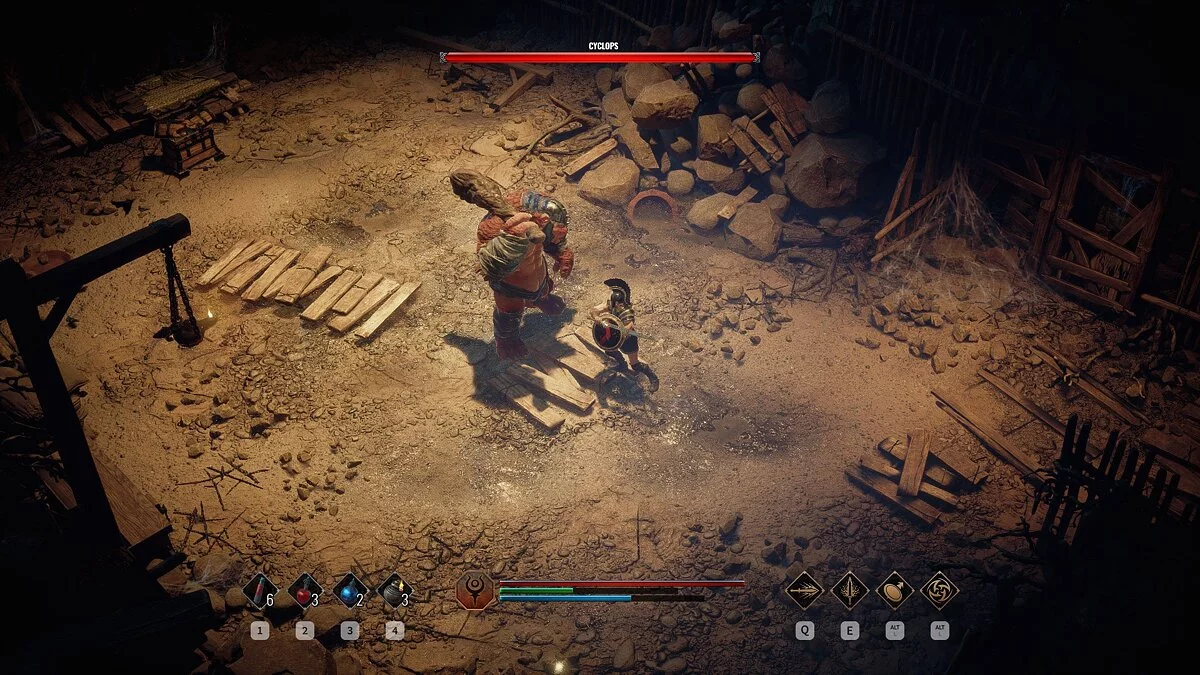
VGTimes: Did your team have any difficulties implementing soulslike mechanics in isometric projection?
Pavel Vaszak: There were certain difficulties in moving the character around the map. Achilles is easier to play with a gamepad than with a keyboard and mouse. Analog sticks are more convenient when it comes to controlling the character's movements. Obviously, soulslike games should be played with a gamepad. Most of the positive reviews we received were for the console versions, as there is not much choice in control methods. Otherwise, we did not notice any differences between the isometric and third-person cameras.
VGTimes: How does player feedback influence development? Especially in early access.
Pavel Vaszak: After the release in early access, we read all the reviews and player reviews. Of course, we listened carefully to their opinions. Many really said important things that influenced further development. But there were also some pretty funny complaints, in which players complained about Achilles' non-canon hair color. We may add a new hair color to the DLC to satisfy the wishes of users (laughs). But first of all, we were concerned about the opinion about the game design, balance and perception of mechanics.
And after the release of the release version, we listen to the feedback of the players, we will create additional content based on their wishes. All recent updates that affected the balance and difficulty levels were created primarily at the request of the players.
About the gaming industry and development in general
We couldn't help but ask questions about the gaming industry and video game development in general.
VGTimes: Achilles is developed on Unreal Engine 4. How difficult is it to work with this engine?
Pavel Vaszak: I have been working with this engine for over 12 years and it has become my native environment. Of course, the fourth version is strikingly different from the third, but when you understand the architecture of Unreal and its features, you can easily avoid the difficulties in optimization and understanding all the structures. It has become so familiar to me that I don't even want to hear from programmers suggestions to change the engine. For the next game, we will take the fifth version of Unreal.
VGTimes: Has the introduction of Blueprint to Unreal Engine affected the speed of development?
Pavel Vaszak: Of course. We wrote most of the code manually, but we are creating the latest updates and mechanics on Blueprint. This feature allows us to make targeted adjustments faster without affecting the main part of the code.
VGTimes: Quite recently a dispute broke out over the use of assets from the Unreal marketplace. In your opinion, is this a normal practice for developers?
Pavel Vaszak: Yes, we took very few features from this marketplace. For example, Megascans technology, as well as some packages with design solutions. We don't see anything wrong with that. 5-10% of all assets won't affect the project's own identity. Trees or rocks are found in many games, and players often don't pay attention to them. That's why it's easier to buy them than to create them yourself.
VGTimes: Is it difficult to find a talented specialist and how difficult is it for a newbie to get into a game studio without any experience?
Pavel Vaszak: It all depends on the position. If a candidate is applying for a senior position, then of course we look at the experience and previous work. The requirements for newcomers are completely different. The most important thing for us is creativity. Game development is a creative environment, and it is important for the studio to get a specialist with a creative approach. It is permissible for a young level designer not to understand software and not to be able to model primitives. The main thing is that he has interesting ideas and plans that he can apply in practice.
In our studio, we pay attention to communication. The team is important to us, not individualists. Even if a developer with 30 years of experience or a superstar who will pull the «blanket» of development onto himself knocks on our door, we will not take him on staff. It is easier to hire a team player who will find contact with each participant in the development.
From our experience, I can say that hiring a newbie is much better and more useful. Firstly, they don't ask for huge sums for their services. They always have a reserve of creativity, and they learn faster. It's more pleasant to hire people with burning eyes than individualists who work only for a salary.
VGTimes: Is development really getting more expensive, and should games cost more?
Pavel Vaszak: Yes, but not very much. We can't give you any specific numbers based on our own example, but we are quite happy with the price standards that exist on the market.
VGTimes: Artificial intelligence is actively used in all areas. How can it be used in video game development?
Pavel Vaszak: We see great potential in AI. Not only in creating in-game assets, but in game design systems. In our game, we have implemented global artificial intelligence that controls the interaction of NPCs in the environment. That is, all opponents live in the game world without scripts. Global AI constantly comes up with unique situations for the player. It creates interactions between enemies and cooperates them in certain situations. We are working on a more advanced system that will give a sense of unpredictability. To make it clearer to you, it's like the director of Left 4 Dead, only smarter and not tied to algorithms.
***
As we found out, transferring soulslike to isometric is not such a difficult task if the developers have the necessary experience and understanding of the genre rules. In turn, Achilles: Legends Untold is a great example of how the gaming community influences development and helps game designers improve their creation. We would like to add that the project turned out to be worthy, and its release version is a cut above what we saw in early access. Dark Point Games studio has many more content updates in its plans, thanks to which the game will improve and develop based on player feedback. Many large studios should learn from smaller teams how to properly interact with the audience and satisfy their wishes.
VGTimes has been operating since 2011 and during this time has visited dozens of exhibitions and festivals, where our journalists have collected many exclusive materials. For example, in 2019 we got to a closed screening of Cyberpunk 2077 at gamescom, in 2017 we prepared a photo report from WG Fest, in 2020 we were at the largest gaming event in Central Asia CAGS, and also visited IgroMir several times, where we saw Hideo Kojima and other famous developers.
-
VGTimes interview with Dune: Awakening producer at TGS 2024: will movie characters appear in the game, how big will the world be, and what is the main difference between the project and the Dune universe
-
VGTimes Interview with Escape from Tarkov and Tarkov: Arena Developer at TGS 2024
-
VGTimes Interview with the Developers of Serious Sam: Siberian Mayhem
-
VGTimes Interview with the Author of the Indie Hit Gedonia
-
VGTimes Interview with Reanimal Producer at TGS 2024














